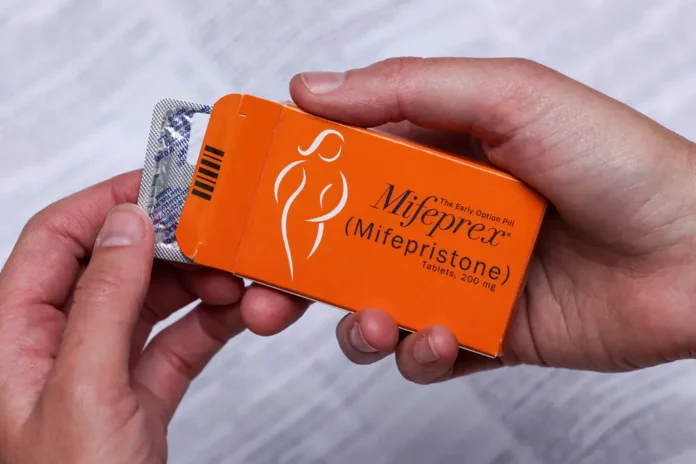CONTENT WARNING: This article contains mentions of rape, sexual assault and mild depictions of a person’s experience with getting an abortion. Please use caution before reading.
On March 17, Wyoming became the first state to ban abortion pills and passed another bill outlawing abortion except in cases of rape, incest or lethal anomaly.
The pills ban makes the state the first to tackle chemical abortions themselves instead of the entire practice and takes effect July 1.
According to CNN, the ban makes it a felony to dispense, distribute, sell, prescribe or use mifepristone and misoprostol, the two most common and effective abortion medications.
Violating this law is punishable by a fine of up to $9,000 and six months in prison. Violating the Life is a Human Right Act, which outlaws abortion, is a felony punishable by a fine of up to $20,000 and five years in prison.
Under the act, abortions will still be permitted for ectopic pregnancies and other exceptions such as women needing or receiving cancer treatments. It will go into law without the governor’s signature.
When the law passed, Republican Gov. Mark Gordon expressed concerns that “this new law will only result in a new lawsuit, which will delay any resolution to the constitutionality of the abortion ban in Wyoming,” according to his office.
Wyoming District Court Judge Melissa Owens blocked enforcement of the Life is a Human Right Act on Wednesday citing a 2012 amendment to the state constitution. The amendment was originally passed by the state GOP to curb the Affordable Care Act.
According to the amendment, “each competent adult shall have the right to make his or her own healthcare decisions.”
However, the act does not define abortion as healthcare and instead defines it as “the intentional termination of the life of an unborn baby.”
Camille, who requested her last name remain anonymous, had two abortion procedures years earlier when there were fewer restrictions in place. She did not have other safe methods to choose from because of where she was in her pregnancies.
“I can’t even imagine what I would have done at the time because I was so young,” she said. “I probably would have just freaked out.”
Wyoming was one of 13 states that enacted trigger bans when the Supreme Court overturned Roe. V. Wade.
“It’s a really scary time to be a woman or person with a uterus,” Camille said.
She is worried that the abortion pills ban and the potential passing of the overall abortion ban will cause an increase in illegal, fatal and botched abortions.
The FDA approves using mifepristone and misoprostol up to 10 weeks into pregnancy. Other evidence and patients outside the U.S. suggest the medications work safely beyond 11 weeks.
Of patients in the U.S. who received medication abortions, 90% of them occurred in the first trimester. It is the most common first-trimester abortion method.
The two medications work by inducing a miscarriage. Mifepristone is taken first and blocks the hormone progesterone which is needed for a fetus to grow inside the uterus. Misoprostol should be taken 24-48 hours after. The process can also be completed with misoprostol only.
The medication causes uterine cramping and bleeding similar to a heavy period while softening the cervix to expel the pregnancy.
Many patients describe symptoms as not much worse than their menstrual cycle. Patients also commonly experience flu-like symptoms which subside in one to five hours.
Roughly 5% of patients may experience incomplete abortions, but this can be solved with a second dose or surgical removal depending on how significant the case is.
Around Wyoming, Colorado is the least restrictive state for people seeking abortions. Nebraska allows abortions up to 20 weeks post-fertilization, and Montana allows abortions up to 24 weeks.
The Montana legislature tried to reduce that time to 20 weeks in 2021, but it was blocked by a judge.
“Do what you have to do. Go where you have to go. As much as you can, use your voice,” Camille said.
SRU does not provide abortion medications or procedures of any kind, but they do offer referrals, according to Lenora Karenbauer, a nurse supervisor in SRU’s student health services.
The closest center they can refer to is Allegheny Reproductive Center in Pittsburgh.
“Our role is to give patients accurate information that includes safe and affordable healthcare and includes all choices,” Karenbauer said. “We’re here to support them and what’s right for them.”
SRU can prescribe Plan B and birth control medications to help prevent pregnancy. The student health center administered 185 pregnancy tests in 2022 and four were positive, according to the student health center fiscal report.
Karenbauer attributes these numbers to the wider accessibility of birth control. Many students also come into college with IUDs or Nexplanon, two common types of long-term birth control.
“I want women to know that there are other women out there, and men, who are supporting them,” Camille said, “and women who have been through it, so they’re not alone.”








